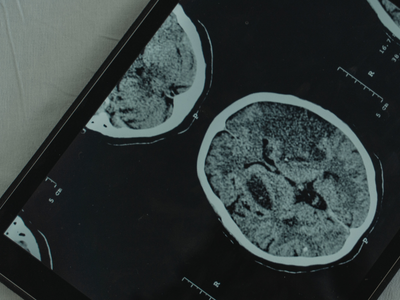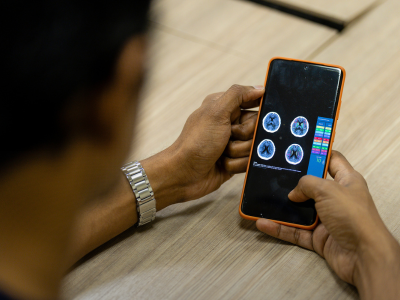Published on 28 August 2025
A brand new initiative integrates predictive artificial intelligence with personalised health coaching to empower early action and prevention.
It was in 2022 that alarm bells began ringing for Mr Tan Poh Kee.
Following increasing bouts of forgetfulness, the now 62-year-old could not recall receiving a text from a close friend about his father’s death, causing a big misunderstanding.
Mr Tan decided to seek medical attention and was referred to the National University Hospital (NUH), where he was attended to by Dr Jennifer Hung, a consultant at the Division of Neurology, Department of Medicine, NUH. A comprehensive health checkup, including blood tests, a neuropsychological assessment and a magnetic resonance imaging (MRI) scan, revealed a reduction in brain volume.
“This meant that I could potentially develop dementia, and the million-dollar question was, ‘When?’” recalled Mr Tan.
Closing the diagnosis gap
A new study by a multidisciplinary research team from the National University Health System (NUHS) aims to address the underdiagnosis of dementia through the power of artificial intelligence (AI), community partnerships and global expertise.
The team’s project, titled ‘Innovative Methods for Proactive Risk Optimisation and adVancEment in Cognitive Health (IMPROVE-COG)’, hopes to shift the paradigm from late-stage diagnosis to lifelong brain care.
In support of these efforts, the Ministry of Health has, through its National Medical Research Council (NMRC) Office, awarded S$2.33 million in research funding to the NUHS team under the NMRC Healthy and Meaningful Longevity – Cognition Grant Call.
A hidden epidemic
According to the Well-being of the Singapore Elderly (WiSE) 2023 study, 51.5 per cent of dementia cases in Singapore remain undetected. However, about 45 per cent of these are preventable through early lifestyle interventions.
“Many older adults and their loved ones believe memory loss is simply part of ageing, and may not realise that help is available,” said Principal Investigator Dr Tan Li Feng, Senior Consultant, Division of Geriatric Medicine, Department of Medicine, Alexandra Hospital (AH).
With smaller family sizes and more older adults living alone, early signs of cognitive decline are often overlooked, leading to missed opportunities for early support and intervention. Studies overseas also show that in up to one-third of hospital admissions involving persons with dementia, the condition was not recorded accurately as a diagnosis. Undercoding and limited clinician awareness are significant contributing factors to the underdiagnosis.
“Relevant patient information may also be scattered across various healthcare encounters, resulting in fragmented data and missing pieces of the puzzle,” added Co-Principal Investigator Dr Benjamin Tan, Consultant, Division of Neurology, Department of Medicine, NUH.

Some of the clinicians and patients involved in the IMPROVE-COG research study, including Dr Andrew Makmur (back row, second from left), Dr Tan Li Feng (back row, centre), Dr Benjamin Tan (back row, second from right) and Mr Tan Poh Kee (front row, far right).
Harnessing AI and real-world data
The study team, including Health Services Research & Analytics staff at Ng Teng Fong General Hospital (NTFGH), will develop an AI-powered large language model (LLM) trained on anonymised real-world data from NUHS’s DISCOVERY AI platform.
“This project leverages the robust NUHS data infrastructure ecosystem that allows anonymised patient data visualisation, enabling earlier detection and identification, and improvements in clinical care delivery,” says Dr Andrew Makmur, Group Chief Technology Officer, NUHS. “Ultimately, we hope that the LLM will make the process of diagnosing dementia more accurate, efficient and cost-effective.”
This screening and surveillance tool will analyse diverse clinical documentation to identify individuals at risk of mild cognitive impairment and dementia, offering a scalable and cost-effective solution for risk stratification and population health surveillance.
Once the LLM is developed, the team will join forces with the National University of Singapore (NUS) School of Computing. Leveraging geographic information system mapping and spatial analysis, they will explore the relationship between environmental (e.g. exposure to green spaces) and social factors and cognitive impairment, thereby guiding more effective and equitable healthcare interventions.
Launching Asia’s first digital brain care tool
The research team will also deploy Asia’s first digital Brain Care Tool, a culturally tailored application that integrates two key innovations:
- The Brain Care Score (BCS): A holistic score that evaluates 12 modifiable risk factors, such as blood pressure, sleep, social engagement and stress, to provide a bird’s-eye view of overall brain health.
- The Brain Care Coach: A next-generation, AI-powered behavioural intervention tool that delivers personalised nudges, tracks progress, and motivates users to adopt brain-protective behaviours such as exercising, improving their diet and quitting smoking.
Originally developed in the United States by the Brain Care Labs at Mass General Brigham and Harvard Medical School, the BCS is now a cornerstone of the Global Brain Care Coalition. This coalition aims to reduce the global incidence of dementia, stroke and late-life depression by 30 per cent by 2050.
In Singapore, the AI-coach tool will be localised and designed to incorporate community inputs to ensure cultural relevance, so that individuals can engage with it regardless of age, prior diagnoses or digital literacy. The study team will collaborate with community partners like Health District @ Queenstown, St Luke’s Hospital and Yong-en Care Centre to pilot and develop it.
The power of lifestyle changes
For Mr Tan, who was used to a sedentary lifestyle and poor sleep quality, the health checkup served as a sobering wake-up call. It prompted him to change his lifestyle habits, including exercising two to three times a week, adjusting his diet to eat more brain-nourishing foods, playing mahjong and cognitive games to stimulate his mind, and getting seven to eight hours of sleep every night.
Just slightly over a year into adopting a healthier lifestyle, Mr Tan has seen significant changes in his cognitive markers. “I had an appointment with Dr Hung recently and had a perfect score on a cognitive test,” he happily shared.
“Sleep and lifestyle habits are very important in maintaining brain health, and we need to actively work our brain too,” said Mr Tan.
In consultation with Dr Andrew Makmur, Group Chief Technology Officer, NUHS; Dr Tan Li Feng, Senior Consultant, Division of Geriatric Medicine, Department of Medicine, AH; and Dr Benjamin Tan, Consultant, Division of Neurology, Department of Medicine, NUH.




